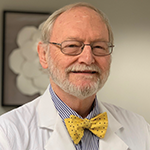“Years later (1996) when I ended up as chief of rheumatology at WUSTL and decided that we needed more clinical help, I asked Rick if he would be interested in having an academic rheumatology practice. To my surprise, he said ‘Yes,’ joined the faculty, helped us immensely in clinic, then set his sights on reinvigorating our fellowship program. He was a big hit with the fellows because he took a personal interest in their well-being and success. Each year our division would sponsor a party at the ACR annual meeting, and it was heartwarming to see what a thrill they got from reconnecting with Rick.
“When Rick joined us, rheumatology across the nation was not thought of very well. This was a time when many internal medicine subspecialty fellowships were suffering because general internists were making very high starting salaries, suggesting to many that it didn’t make much sense for young internists to go into non-procedure-oriented subspecialties like rheumatology. But we felt we needed to train the next generation of rheumatologists who could best advocate for our patients and offer them exceptional care.
“Rick did a lot to help turn things around at Washington University and to make our program thrive. He also volunteered his efforts at the Arthritis Foundation and the ACR, having a greater impact at the national level. As far as his legacy, he trained the next generation of clinical rheumatologists from our program and beyond, who are now spreading his education, skills and compassion around the globe.”
“Richard ‘Rick’ Brasington Jr., MD, embodied the role of teacher, mentor and sponsor,” says Lisa Zickuhr, MD, MPH, a rheumatologist at Washington University Physicians. “My first rheumatology teacher at Washington University at St. Louis School of Medicine, he introduced me to synovial fluid analysis during the summer lecture series of my intern year, a lineup of sessions designed to get newbie residents up to par. ‘Call a rheumatology consult if you’d like an extra thoughtful interpretation of synovial fluid results,’ he advised cheekily, leaning into the stereotype that rheumatologists think a lot. Ooh! I thought. This guy is funny and wise!
“I owe a great deal to Rick for his role in my life as a master clinician and educator, a wise mentor and a fierce sponsor,” Dr. Zickuhr says. “I am grateful for his examples of integrating humor with teaching, humility with excellence, and a cocktail with scholarly conversation. Thank you, Rick, for your insightful Rick-isms and questions while, most importantly, helping those of us around you achieve our vision of ‘What do we want to be?’”

